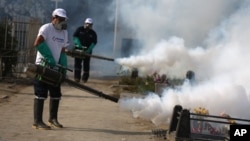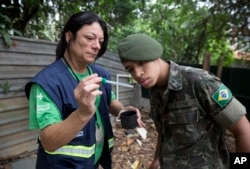The Pan American Health Organization, the regional office of the World Health Organization has released a statement on the transmission and prevention of the Zika virus, the mosquito-borne virus the agency says is "new to the Americas."
The virus has caused alarm because it is suspected to cause severe brain damage in newborns, Guillain-Barre syndrome and other auto-immune and neurological disorders.
The PAHO said in the statement Monday one of the most effective forms of preventing the spread of the virus is to reduce mosquito populations by eliminating potential breeding sites in and around households, especially containers and other items like discarded tires that can collect water.
Another effective form of prevention is the use of personal protection measures to prevent mosquito bites.
Those methods include using insect repellent; wearing clothes that cover as much of the body as possible; using physical barriers such as screens, closed doors and windows; and sleeping under mosquito nets, especially during the day when the mosquitoes are most active.
Pregnant women were cautioned to avoid mosquito bites. PAHO said an outbreak of the mild symptoms of Zika has coincided with "a marked increase in microcephaly or unusually small head size in newborns."
The agency said any woman traveling to areas where Zika is circulating should consult with her doctor before leaving and upon her return.
PAHO said the mosquitos that carry Zika have spread to 21 countries and territories in the Americas and will likely reach all nearly areas in the region






